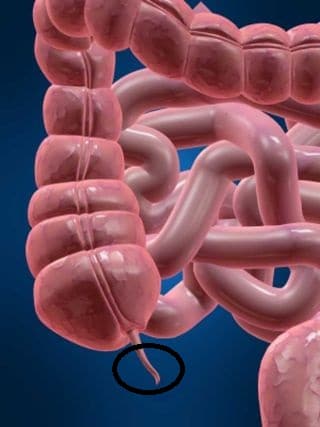Whether you're a healthcare practitioner looking to learn more about appendectomy surgery or someone scheduled to undergo the procedure, knowing what to expect can make a difference.
This guide will walk you through the process during and after appendectomy surgery. It also offers mental and physical preparation tips to manage pain and postoperative symptoms.
What is Appendectomy Surgery?
Appendectomy surgical procedure removes an inflamed appendix, a small pouch attached to the large intestine. When the pouch is swollen, the patient starts experiencing severe abdominal pain, nausea, and vomiting. A swollen or infected appendix causes Appendicitis.
Surgeons perform appendectomy with varying procedures. One of the safest options is the laparoscopic procedure. It involves making several small incisions and using a tiny camera to guide the surgery.
We've got you covered if you want to see what an appendectomy surgery video looks like.
Appendectomy surgery is often referred to as minor surgery as a reference to the ease of the procedure. But all surgeries carry risks, including bleeding, infection, and adverse reactions to anesthesia. You need to follow all pre-and postoperative instructions carefully to minimize the chances of complications.
Before Appendectomy Surgery
Like any surgery, patients of appendectomy surgery need to prepare adequately to ensure a successful procedure and a speedy recovery.
Here's a quick guide to help you get ready:
Consult with your doctor
The first step is to consult with your doctor. You may need to fast for several hours before the procedure and avoid certain medications, supplements, and foods that can increase the risk of complications. Doctors will also schedule you with preoperative evaluation, including blood tests, imaging, and anesthesia consultation.
Follow Preoperative Instructions
Your doctor will likely provide you with a list of preoperative instructions to follow before the surgery day. Patients are always advised to get enough sleep and avoid stressful situations. You need to be healthy physically and mentally for a successful surgery.
Arrange for Transportation and Aftercare
Plan ahead for aftercare to ensure you have the support you need during recovery. You may need to arrange a vehicle to and from the hospital on the day of the surgery. Having someone to stay with you for the first few days of recovery is highly recommended.
During Appendectomy Surgery
The appendectomy procedure requires a team of trained medical professionals to perform safely and effectively.
Here is what you need to know during the process:
Surgical Procedure
As mentioned earlier, appendectomy surgery removes the infected appendix from the lower right side of the abdomen. Surgeons typically use one of two techniques: laparoscopic or open surgery.
Laparoscopic Surgery
The surgeon makes a few small incisions in the abdomen, and a thin tube with a camera and surgical instruments is inserted. The advantage is that surgeons watch a video monitor to guide the instruments and remove the appendix.
Open Surgery
Open surgery involves making a larger incision (about 5 cm) in the abdomen to remove the appendix directly. The appendix is then cut off and removed. After that, the belly is sewn back together. This procedure is done under general anesthesia.
Anesthesia Options
There are different anesthesia options available, including general anesthesia and regional anesthesia.
- General anesthesia makes the patient unconscious.
- Regional anesthesia numbs only a specific part of the body.
Both types of anesthesia have potential risks, such as allergic reactions or breathing problems. Discuss your options with the surgeon and anesthesiologist.
Coping Strategies
The thought of undergoing surgery can cause anxiety or discomfort. But you are free to discuss any concerns with the surgical team. Relaxation techniques like deep breathing or meditation can also help reduce anxiety. In addition, some patients find comfort in bringing a favorite item from home, such as a blanket or a stuffed animal, to the hospital.
After Appendectomy Surgery
The recovery phase of appendectomy surgery is delicate. The risk of an after-surgery crisis is high without a proper post-appendectomy surgery plan and care.
Keep the following in mind:
Immediate Postoperative Recovery
The recovery room is the first place you will stay after surgery. Nurses and other medical staff are with you to monitor your vital signs and ensure your comfort. Plan on spending several hours there.
Pain Management
Pain and discomfort are typical after appendectomy. Your healthcare provider will suggest various pain management options, such as prescription medication or over-the-counter pain relievers. Be aware of the possible side effects of these medications.
Care for the Incision Site
Appropriate care for your incision site is vital to prevent infection and promote healing. Follow your healthcare provider's instructions on how to care for the site, and watch out for any indications of infection, such as redness, swelling, or drainage.
Postoperative Symptoms
Some people may experience nausea, vomiting, or constipation after surgery. Your healthcare provider may recommend over-the-counter or prescription medications to help manage these symptoms.
Recovery Timeline
Be aware that recovery time can differ from person to person. Your healthcare provider will give you specific instructions on when you can return to normal activities, including work and exercise. Be sure to attend all follow-up appointments to monitor your progress.
Conclusion
There you have it. All that you never realized you needed to be familiar with the appendectomy medical procedure. We trust this article has been a valuable asset for anybody facing this procedure.
Stick to doctors' instructions and arrangements, and you'll quickly be in a good place again.



